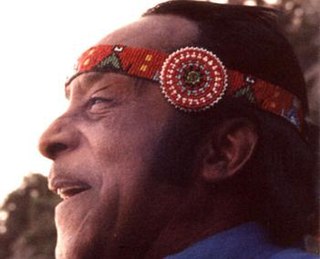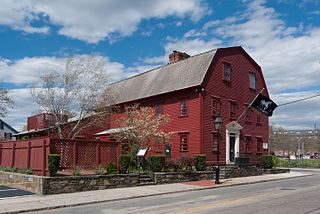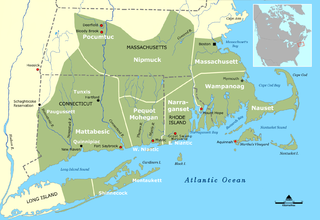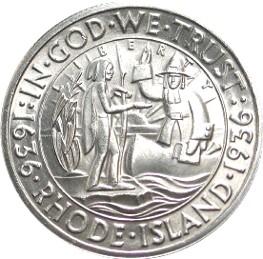Related Research Articles

King Philip's War was an armed conflict in 1675–1676 between a group of indigenous peoples of the Northeastern Woodlands and the English New England Colonies and their indigenous allies. The war is named for Metacomet, the Pokanoket chief and sachem of the Wampanoag who adopted the English name Philip because of the friendly relations between his father Massasoit and the Plymouth Colony. The war continued in the most northern reaches of New England until the signing of the Treaty of Casco Bay on April 12, 1678.

The Narragansett people are an Algonquian American Indian tribe from Rhode Island. Today, Narragansett people are enrolled in the federally recognized Narragansett Indian Tribe. They gained federal recognition in 1983.

Red Thunder Cloud, born Cromwell Ashbie Hawkins West, also known as Carlos Westez, was a singer, dancer, storyteller, and field researcher. For a time he was promoted by anthropologists as "the last fluent speaker of the Catawba language" but he was later revealed to have learned what little he knew of the language from books. The grandson of a prominent African-American attorney and community leader, Red Thunder Cloud was an African American who reinvented himself as a Native American.

The history of Rhode Island is an overview of the Colony of Rhode Island and Providence Plantations and the state of Rhode Island from pre-colonial times to the present.
Ellison Myers Brown, widely known as Tarzan Brown, a direct descendant of the last acknowledged royal family of the Narragansett Tribe of Rhode Island, was a two-time winner of the Boston Marathon in 1936 (2:33:40) and 1939 (2:28:51) and 1936 U.S. Olympian. He ran the marathon in the 1936 Summer Olympics in Berlin and also qualified for the 1940 Summer Olympics, which were ultimately canceled due to the outbreak of World War II.
RISN Operations Inc., also called Rhode Island Suburban Newspapers, is a privately owned publisher of three daily newspapers and several weekly newspapers in the U.S. state of Rhode Island. The company was founded by Illinois-based newspaper executives in early 2007 to purchase the Rhode Island holdings of Journal Register Company, which it did for $8.3 million.

The Great Swamp Massacre or the Great Swamp Fight was a crucial battle fought during King Philip's War between the colonial militia of New England and the Narragansett people in December 1675. It was fought near the villages of Kingston and West Kingston in the Colony of Rhode Island and Providence Plantations. The combined force of the New England militia included 150 Pequots, and they inflicted a huge number of Narragansett casualties, including many hundred women and children. The battle has been described as "one of the most brutal and lopsided military encounters in all of New England's history." Since the 1930s, Narragansett and Wampanoag people commemorate the battle annually in a ceremony initiated by Narragansett-Wampanoag scholar Princess Red Wing.

The Constitution of the State of Rhode Island is a document describing the structure and function of the government of the U.S. State of Rhode Island.

Narragansett is an Algonquian language formerly spoken in most of what is today Rhode Island by the Narragansett people. It was closely related to the other Algonquian languages of southern New England like Massachusett and Mohegan-Pequot. The earliest study of the language in English was by Roger Williams, founder of the Rhode Island colony, in his book A Key Into the Language of America (1643).

The Tomaquag Indian Memorial Museum is an Indigenous museum in Exeter, Rhode Island. The museum was founded by anthropologist Eva Butler and a Narragansett and Wampanoag woman named Princess Red Wing in the 1950s.

The Narragansett Trail is a 16-mile hiking trail located in Connecticut. It is one of the Blue-Blazed Trails maintained by the Connecticut Forest and Park Association, the Narragansett Council, and The Rhode Island chapter of Scouts BSA.
Lorén M. Spears (Narragansett/Niantic) is an educator, essayist, artist, and two-term Tribal Councilwoman of the Narragansett Tribe in Providence, Rhode Island, where she currently resides. Spears has taught for over two decades, including 12 years in the Newport Public School system working with at-risk children in both first and fourth grades. In 2010, Spears was chosen as one of 11 Extraordinary Women honorees for Rhode Island in the area of education.
Princess Red Wing, aka Mary E. (Glasko) Congdon, was a Narragansett and Wampanoag elder, historian, folklorist, and museum curator. She was an expert on American Indian history and culture, and she once addressed the United Nations.

The Rhode Island Tercentenary half dollar is a commemorative fifty-cent piece struck by the United States Bureau of the Mint in 1936. The coin was designed by John Howard Benson and Arthur Graham Carey. Its obverse depicts Roger Williams, founder of the Colony of Rhode Island and Providence Plantations. It was intended to honor the 300th anniversary of Providence, Rhode Island, although it bears no mention of the city.
The Narragansett Times is a publication of Southern Rhode Island Newspapers that serves the Rhode Island towns of Narragansett and South Kingstown. It is published on Wednesdays and Fridays. Its estimated circulation is 3,006 copies.
Cherokee descent, "being of Cherokee descent", or "being a Cherokee descendant" are all terms for individuals with some degree of documented Cherokee ancestry but do not meet the criteria for tribal citizenship. The terms are also used by non-Native individuals who self-identify as Cherokee despite lacking documentation or community recognition.

Detribalization is the process by which persons who belong to a particular indigenous ethnic identity or community are detached from that identity or community through the deliberate efforts of colonizers and/or the larger effects of colonialism.
Native American newspapers are news publications in the United States published by Native American people often for Native American audiences. The first such publication was the Cherokee Phoenix, started in 1828 by the Cherokee Nation. Although Native American people have always written for state and local newspapers, including the official publications of Native American boarding schools, periodicals produced by Native people themselves were relatively few and far between until the 20th century.
Ella Wilcox-Thomas Sekatau, or Firefly-Song of Wind, was a poet, historian, and Ethnohistorian and Medicine Woman of the Narragansett Indian Nation. Instrumental in the Narragansett's federal recognition in 1983, she was a powerful cultural and political presence in her community and across the Native American community of New England. Sekatau was one of the first Native American interpreters to partner with Brown University's Heffenreffer Museum of Anthropology in their education program, and was also a key figure for the Wampanoag history program at Plimoth Plantation, now Plimoth Patuxet.
Everett Gardiner Weeden Jr., or Tall Oak, was an artist, activist, survivalist and historian of Mashantucket Pequot and Wampanoag descent. Tall Oak dedicated his life to the education and advocacy of Indigenous rights, and was a founding member of the National Day of Mourning in Plymouth, Massachusetts.
References
- ↑ Geake, Robert A. (2011). A History of the Narragansett Tribe of Rhode Island: Keepers of the Bay. Charleston, SC: The History Press. pp. 126–128. ISBN 978-1-60949-258-8.
- ↑ Red Wing, Princess (Sep 1935). "Our Purpose". The Narragansett Dawn. Retrieved 13 April 2013.
- ↑ Boissevain, Ethel (1 September 1959). "Narragansett Survival: A Study of Group Persistence Through Adapted Traits". Ethnohistory. 6 (4): 347–362. doi:10.2307/480725. JSTOR 480725.
- ↑ Delucia, Christine M. (2018). "Monumentalizing after "Detribalization," and Swamp Discourse from Casinos to Carcieri". Memory lands: King Philip's War and the place of violence in the northeast. New Haven. ISBN 9780300201178.
{{cite book}}: CS1 maint: location missing publisher (link) - ↑ Princess Red Wing (Sep 1936). "Our Purpose". The Narragansett Dawn. Retrieved 5 April 2013.
- ↑ Little Bear (April 1936). "Our Slogan". The Narragansett Dawn. Retrieved 4 April 2013.
- ↑ Redwing, Princess and Ernest Hazard (8 September 2006). "The Narragansett Dawn". Special Collections (Miscellaneous). URI Digital Commons. Retrieved 2 April 2013.
- ↑ Flying Squirrel (Aug 1936). "The Indian". The Narragansett Dawn. Retrieved 5 April 2013.